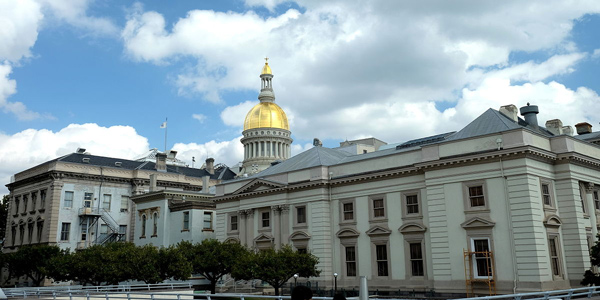By Peter Key
New Jersey lawmakers on Thursday passed a pair of bills that could significantly shape the state’s generation portfolio over the next decade.
One bill would provide two Public Service Enterprise Group nuclear power plants with subsidies costing ratepayers about $300 million per year. The other would require the state’s power sellers to get half their electricity from renewable sources by 2030.

New Jersey’s State Capitol Building
By a 29-7 vote, the state Senate passed S2313, which would create a zero-emission certificate (ZEC) subsidy for nuclear plant operators that can show the New Jersey Board of Public Utilities their plants need financial support to remain operating. The bill passed the General Assembly on a vote of 60-10.
The bill now goes to Gov. Philip Murphy, who will have 45 days to decide whether to sign the bill, veto it or allow it to become law without his signature. He could also conditionally veto the bill and send it back to the Legislature with proposed changes.
ClearView Energy Partners gave Murphy a 65% chance of signing the bill but said he may conditionally veto it, in which case the Legislature could agree to his proposed changes with a simple majority vote. If he vetoes it, the Legislature would need a two-thirds majority vote for the bill to become law.
If Murphy does sign the bill, ClearView says it expects opponents will file a lawsuit in the U.S. District Court for New Jersey challenging the ZEC program on grounds similar to those of lawsuits challenging similar programs in New York and Illinois. ClearView also said it thinks New Jersey lawmakers structured their state’s ZEC program with such lawsuits in mind.
The nuclear subsidy bill drew a mixed reaction. The Natural Resources Defense Council has said it will not oppose the bill, while Jeff Tittel, director of the New Jersey Sierra Club, said it would have “a chilling effect on spending more for renewable energy, because to build out renewable will cost much more.”
The Electric Power Supply Association and New Jersey Petroleum Council also panned the nuclear bill, while PSEG spokesman Michael Jennings called it “a sensible solution that protects the viability of nuclear energy and its benefits for New Jersey, while at the same time ensuring consumers are protected, as well.”
The other bill (A3723) would require electric power suppliers to procure 35% of their power from renewable resources by 2025 and 50% by 2030.



